Thank you so much to those of you leaving comments! They make me feel so, so good, more than you probably know—like, one of the big highlights of my day every time. The support and encouragement is out of this world.
If you feel so inclined, feel free to leave questions in the comment section as well! I’ll do my best to answer them.
Wednesday, October 16th New experiences are flying by faster than I could possibly blog about them. Last week I went with my language class to observe a high school math classroom in a nearby town. Last weekend all the other volunteers and I went to help clean up Namaacha’s high school, where my brother Junior goes to school. It was about 105 degrees F on Saturday, so I went to the local pool with my brothers. Two days later it was coat weather. I am not making this up.
Since there’s so much going on, what I’ll do is pick out one event in particular to write about: cooking with the moms! This is exactly what it sounds like: yesterday morning we had this scheduled event where instead of having normal language class in our small language groups, we got together in a group with our moms for a cooking-centric cultural exchange. The idea was that we volunteers would teach the moms how to cook some American dish and they would teach us how to cook a traditional dish of their own. We went big with an ambitious choice—pizza. The moms played it safe with the classic rice/xima/chicken/couve combo. All of this was facilitated by my language teacher Eureko, who was equal parts language coach, cultural liaison, cheerleader, MC, and historian (some of the pictures below were taken by him).
 The moms were a site to behold. Tough, aging women with 500 year-old voices who have seen more changes in Mozambique in their lifetimes than I can possibly imagine. Like us, Portuguese was once a foreign language for them; these women grew up speaking Xangana in the house. As Eureko continually joked, we Volunteers weren’t allowed to speak English and they weren’t allowed to speak Xangana… just Portuguese. Unfortunately, my host family mom wasn’t able to make it due to the fact that she ended up having to travel to a funeral, but I was happy that my sister-in-law Aida was able to fill in as the representation from my family.
We worked and cooked outside of Steven’s (other PC trainee) host family’s house in the sun. The first order of business was the much-anticipated killing of the chickens that were running around the yard when we arrived. Learning how to kill a chicken is one of the many things we Volunteers are supposed to learn how to do during homestay/training here in Namaacha. I knew I was going to have to do it sooner or later, and my philosophy is that that’s a good thing: if I’m eating chicken and other meats all the time, I should have to kill the animal myself. It seems only right, to me. Otherwise I’m just turning a blind eye to something barbaric but that I continue to participate in.
Just the same, I found myself waay not ready for it or psyched up enough for it when the time came. It bothered me more than I thought it would. We were 6 Volunteers and only 3 chickens, so I was able to just sit this round out. It was surprising to see who stepped forward enthusiastically to volunteer for the act and who backed away queasily. I guess it always is with this kind of thing. It’s like, really Fei? I hadn’t pegged you for the snuffing-the-life-out-of-a-helpless-creature-with-little-more-than-your-bare-hands type. :)
Just to clarify, killing a chicken in Namaacha, Mozambique means sawing its head off with a blunt knife. Like, blunt enough to cut vegetables in your hands with. Yes, the worst part is the struggling of the chicken as it’s pinned down, at least from my perspective watching. I’m making too big a deal out of all of this for sure, it’s just that it’s so new to me. Which is strange. It’s a part of daily life here and all over the world, and has been for a long, long time. Our ancestors no doubt personally killed animals to eat all the time, for many of us it was as recent as our grandparents or great-grandparents. Getting to completely mentally separate the food you eat from the thing you see walking around is a very recent human phenomenon, a luxury of modern technology and modern economies. I didn’t kill any chickens yesterday, but I helped wash and de-feather them, which was weird enough. I thought about how many tens of thousands of times I’ve eaten meat in my life without once having to be a part of the process.
 It turns out that prepping and cooking chickens is a whole lot of work (killing, skinning and de-feathering, toenail clipping, washing, removal of organs that’ll make you sick to eat, removal of feces from intestines, marinating, then actual cooking. The moms did most of that, but all of us PCTs helped a little throughout the process. Almost as much work goes into the sauces that the moms made, which we PCTs helped out with as well. Some of the highlights included pounding the nuts into fragments using something like a small, vertical battering ram (see picture to the left), and taking coconut shavings by scraping out the inside on this thing that you sit on (see picture in slideshow below).
One thing that was pretty jarring for me was the way we dealt with food sanitation. Or, by the standards of the U.S., completely neglected to deal with it. While prepping the chickens for example, we had two buckets side by side out in the dirt. One was for chicken parts we would be eating, the other for parts humans can’t eat without getting sick. A lot of stuff moved freely between the buckets. The knife that was used to kill and gut the chickens was wiped off in the dirt, then it was used to cut vegetables. Raw chicken buckets were cleaned by swilling around a little bit of water inside, then repurposed to hold food that was ready to eat. The raw chicken gunk on our hands from the prep-work quickly found its way to the outer surfaces of just about all of our cooking utensils. Hands were washed with just a modest and fleeting trickle of water, and nothing of soap. I felt pretty ridiculous soaking our pizza vegetables in bleached water to remove water-borne bacteria (as Volunteers are instructed to do by Peace Corps) in the midst of everything going on with the chicken. It felt about as pointless as combing your hair in a hurricane.
Just the same, and despite everything I just wrote, I can’t stress enough how excellent this day was. What happened in my life to make me so blessed as to get to be here right now?? It’s more than I could’ve ever asked for, working alongside these Mozambican women in the African sun, speaking Portuguese. Surreal. I never would’ve dreamed of this years ago living in the States.
The pizza we made turned out shockingly well given the ingredients we had to work with (ketchup and 300% fake American cheese), and I think the moms really got a kick out of it. The Mozambican dishes were great, as always—I’ve had them numerous times at home before. It also felt really nice to show the moms and Aida that we’re capable of doing real work if just given the chance. The best thing though, was that we all had a lot of fun and laughed pretty much throughout the whole day. I’m going to stop writing now and turn it over to the photos in the slideshow below, which paint a better picture than I ever could. Enjoy:
Wednesday, October 9th
Boa tarde! Estou bem, obrigado. I’m a week and a half in to life in Namaacha, and I’m having a great time! I’m settling in nicely: I wake up pretty early every morning here in my mosquito net bed in my host family’s house near the Swaziland border, typically around 5:30 as the sun’s coming up. The first thing is to warm a bucket of water on the stove so I don’t have to tomar banho cold—this place is freezing at night and in the morning! After all that I get dressed, pack up my things for the day, and tomar cha (have tea) with meu pai (my dad) if he’s around. Fun fact: non-flip-flop sandals are considered business-casual in Mozambique, so I usually strap on my sandals and walk to class.
Monday through Friday, I spend pretty much all day with my other fellow PCTs (Peace Corps Trainees) at one of three places: Portuguese language class in small groups (4 or 5 students), how-to-be-a-teacher class in much larger groups, or general information class with all 50 PCTs that make up my Peace Corps Volunteer trainee group—Moz 21.
Portuguese ClassWe have Portuguese class almost every day of the week, for either a half day or a full day. Each of us is assigned to a small study group, or turma, and our very own Portuguese teacher! We hold class in one of the group members’ (PCTs’) houses. Having a teacher all to yourself in a group of only 4 or 5 students is a great way to learn a language. Peace Corps is very serious about teaching us Portuguese fast, which is awesome; I realize that in a VERY short amount of time I’m going to have to be teaching classes myself in Portuguese! If you haven’t learned a second language (in the context of having native speakers around to talk to), you are really missing out! It is such a joy. You feel this incredible heightened connectivity with a huge new group of people you can now talk to. It feels like having a superpower. And it’s one of those wonderful things that actually makes you smarter as you learn it, not just puts knowledge into your brain but makes you smarter, more creative, your brain more flexible. Learning Portuguese from a Spanish background is like what people who speak only one language imagine learning a second language to be like...you mostly say the same words you’re used to, but with a funny accent, and you throw in the occasional stereotypical Portuguese sound. It’s actually pretty hilarious for the first week or so. Stereotypical Language Sounds (a guide to making fun of other languages):- Portuguese – everything ends in –ão (pronounced a very nasally “ow”, like you just stubbed your toe) like cão. (cão = dog)
- Spanish – everything ends in –o or –a like planeta (planet)
- French – everything ends in –eaux or something… I don’t actually know anything about French
- English – everything ends in –tion like communication. At least in Ecuador, Spanish speakers throw –tion on the end of Spanish words when they want to make fun of English. I’m not kidding. For planeta, they would pretend to be speaking English by saying planeta-tion, and then laugh a lot.
I actually just got bumped up to new language group this week. It’s exciting to be at a more advanced level, but I do miss my old crew!—Nuno, Carly, James, Kristina, and Gabriela. Here’s a photo of all of us the day we went to Maputo, last Saturday. Nuno is the teacher. Behind us is a bay that connects to the Indian Ocean!
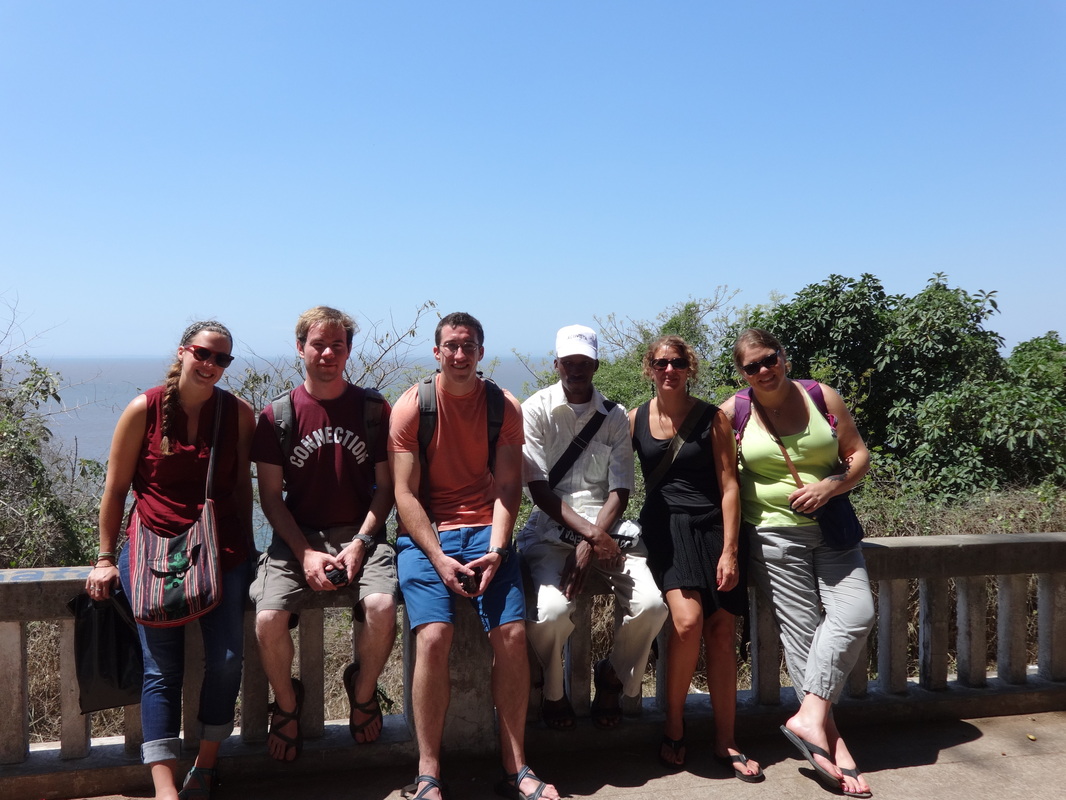
Me and my first turma in Maputo
One more language note: my mãe (mom) taught me some Xichangana words last week! Like many people in Namaacha, she grew up speaking Xichangana at home, not Portuguese.
Mbilwini = Corazão = Heart
Hosi = Deus = God
Tech Class (how to be a teacher)
I have some very exciting news: I’ve been moved from English to Math! That means for the next two years, I’ll be teaching secondary school math instead of English! (It actually could end up being physics too.) The Mozambique PC program is a little short on math teachers at the moment, and I offered to move if they wanted, what with my engineering background and all. And they switched me! I honestly was pumped to teach English, but I’m more pumped to teach math. What’s also exciting about this news is that I’ll be teaching exclusively in Portuguese starting in January! (TEFL, conversely, obviously requires you to speak English.) Wow. It’ll be challenging, but it also pretty much guarantees that my Portuguese will be excellent within a few years.
Our tech classes just started, so I don’t know too much about them yet. But today we went and observed a secondary school math classroom in a neighboring town!
CORE (general information class)
This happens once a week for an entire day, and is a somewhat rare opportunity for all 50 of us PC trainees to see each other—that’s because most days you spend with just your turma, your small language group. CORE is where we’re given talks on all sorts of topics, like Mozambican history, the Mozambican education system, food and water safety and preparation, how to deal with things like scorpions and black mambas, etc.
Why is Peace Corps awesome? Because yesterday we were given an hour-long lecture on diarrhea alone. The different reasons for it, how to deal with it, what to do and not to do, etc. Serious visuals included in a way I won’t go into. Super practical knowledge to rely on for a whole lifetime, I’d say. We were also given a totally different excellent talk on how to not be unhappy for the next 2 years, dealing with isolation and loneliness, frustration, stress, etc. They actually showed us an intricate graph of statistical average PC Volunteer happiness/miserableness vs. time, which I thought was really cool. Turns out there are some long slumps to expect at a couple of points throughout the 27 months. This really isn’t going to be easy. But it’s just awesome how frank Peace Corps is about everything. It’s hard to believe this is a government organization.
At the end of CORE yesterday, we were treated to the first in a series of cultural exchanges, where the Mozambican Peace Corps staff (the PC staff is basically all Mozambican) and local Mozambicans show us some of their culture, and we trainees show them some of our culture. They performed music for us, showed us art, and danced like crazy—my personal favorite part. One of the dances the kids did, which I think was a dance related to harvest celebration, was really, really cool. Their legs were flying around while this intense drum beat played. It’s not hard to see why African rhythm sensibilities are the best thing that ever happened to American music.
Food! I can and probably should write an entire post dedicated just to food at some point. It’s pretty good! I guess I have two early favorite dishes: (1) couve, which is a leafy green mush dish served with rice, and (2) chicken in peanut sauce, also served with rice. I’ll try to take and upload some pictures! Among my least-favorite things I’ve eaten would be chicken feet, although this is not my first encounter with chicken feet. The evolution of Brian’s tolerance of eating chicken feet:- 2011, China: Brian served chicken feet once, repulsed, didn’t touch it
- 2012-2013, Ecuador: Brian occasionally served chicken feet in soup, ate the soup with only minor uneasiness, didn’t eat the chicken feet themselves
- 2013, Mozambique: Sucking the meat from each chicken toe alongside my pai, doing the same
 This man is your representative in Africa. This man is your representative in Africa. I am not a particularly brave person, as anyone who has ever stepped onto a roller coaster with me knows. But living abroad in a strange country does something to you, and you become 1000 times more open to new experiences. You sort of have to. It’s like some kind of survival mode in a way I can’t quite explain. I’m not talking about doing stupid/dangerous stuff, I’m talking about things that help you feel more normal here and more like you belong, like trying things the locals do and making friends at all costs. I think all of us are participating in things normally beyond our comfort zone. Vegetarians are eating meat. Carnivores are eating chicken hearts for breakfast. Wallflowers are attending parties. Germaphobes are—just kidding, a germaphobe would not last a day here. Anyway, I’m gonna need all the blind willingness to try new things I can possibly muster, since my mom says I have to kill a chicken soon.
 I’ve been getting to know my family here more and more, which has been great. My ability to converse is still really limited, but it’s already way better than it was a week ago. I’ve been teaching Valdo how to play guitar, playing cards with Junior, learning more Portuguese and English with Fedinho (the 8 year-old), chatting with Arsélia, letting Aida try to read the English on my kindle out loud (she’s gotta be without question the first Mozambican resident of Namaacha to read Infinite Jest), and also talking with my pai and mãe. Last weekend for the first time I got to meet my other irmã (sister), Lalita, and my other irmão (brother), Nélio. That was really great. I had a nice, long, excellent talk about Mozambique with Nélio last Friday. Last Friday was the celebration of Día da Paz—a national holiday celebrating the anniversary of the peace agreement that ended the huge Mozambican civil war roughly 20 years ago.
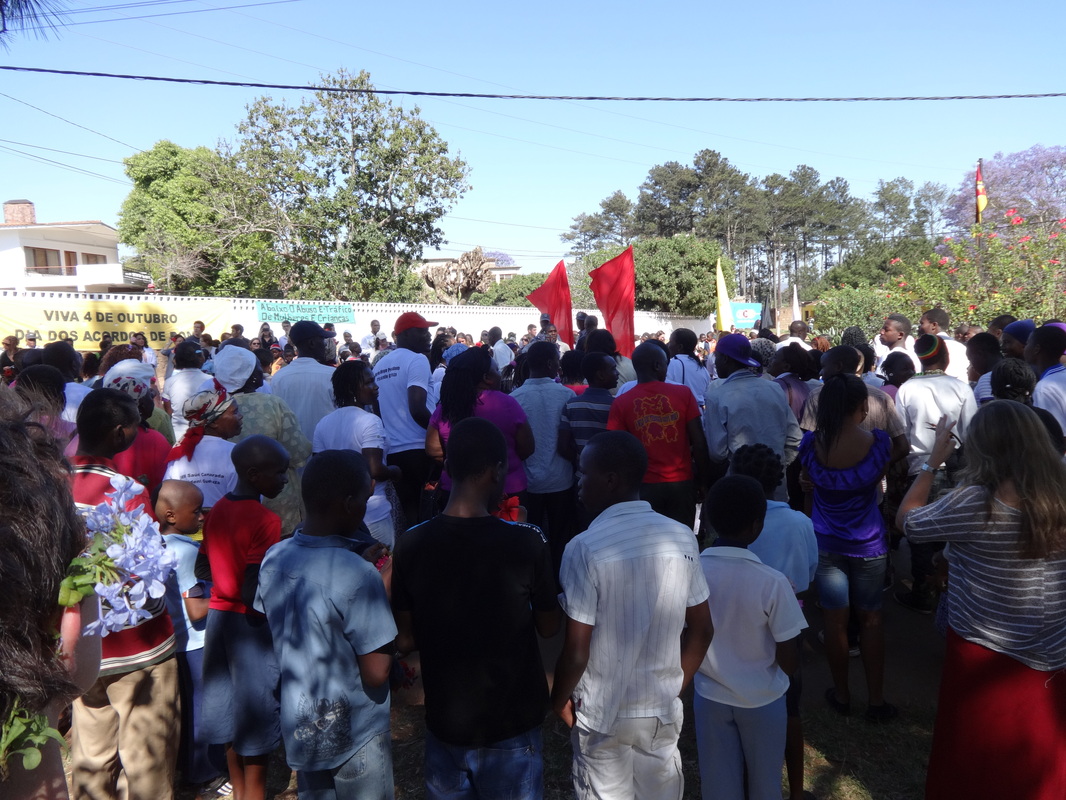
Ceremony for Día da Paz in Namaacha's town square
I could write so much more about this experience so far, but this post is already pretty long. Maybe I’ll just end by talking about last Saturday. I went to a party with my mãe, and it was so excellent! It was probably my single favorite experience here so far. The occasion was two-fold: a friend of my mom’s was having a birthday, and somebody else had just graduated from either high school or college. A couple of other PCTs whose moms are also friends with the hostess were there too, so we all got to show off our moms, who were increasingly drunk as the night wore on :) Tons of food, tons of wine (it was a pretty fancy party), and tons of dancing! Peace Corps messaging to us Volunteers places a lot of emphasis on Integration into the community, and there could be no better example of that than this night. For once, I got to set aside my language frustrations and just dance like crazy in a sea of other dancing Mozambicans. (Side note: I can confirm that we Americans are still lagging behind in dancing, internationally speaking—these Mozambicans had some serious moves.) It was hours of the best flow I have experienced all trip—my higher brain shut off and I was really just lost in the moment.
That’s all for now! I miss you all back home and abroad and I hope this world is being good to you. Keep sending me positive energy!
Much love,
Brian
Hi everyone! I’m alive and well here in Namaacha, Mozambique, and am having a great time! I’ve been writing blog posts, but only recently have I gotten internet access to post them (it’s still limited). So here’s what I wrote the weekend I arrived in Namaacha!:
Sunday, September 29th
I’m at my host family’s house in Namaacha!! And incredibly, Swaziland is right on the other side of my backyard!! :) How cool is that?? This whole experience really cuts through the daze that not sleeping regularly/well or doing any biological process regularly/well puts you in. I can’t believe I’m living in Africa!! That thought keeps coming back to me. This has really been the kind of experience I know I’ll remember forever, something unlike anything I’ve ever done before.
Where to begin? We had this awesome bus ride yesterday from the capital city (Maputo—pronounced “Mah-puh-tuh”) to our training city/village (Namaacha—pronounced “Nah-maj-ah”) that finally allowed us to see more of the city and the countryside. The excitement on the bus was crazy, and we were all excitedly/nervously studying the Portuguese cheat sheets they gave us in the meager hope of being able to say something--anything—to our host families when we arrived. I at least had “Nice to meet you” (“Muito prazer”) down pretty solid. Getting off that bus and walking to the receiving area was so exhilarating! It felt like stepping onto a roller coaster or diving into cold water, a big plunge. The host family members were all singing when we walked in, which was awesome, and they were holding up signs with our names on them. I found my person, a young woman, and wanted to give her a big hug and tell her how excited I was, but instead we did a small, hesitant hug, and then she took my hand and led me away.
Being led down the streets by the hand makes you feel like a little kid, which is about right. That’s what I sort of am here, a little kid or even a baby. I have to be taught how and when to eat, how to bathe myself, how to use the bathroom. The 8-year-old in the family, who is adorable, has been teaching me how to count to 10 like some learned sage (relative to where I am). So yeah, the experience is a lot like being a baby, and that’s fine with me. You just gotta go with the flow around here and humbly accept that you are pretty much useless for the time being.
As for the woman who picked me up from the reception area in town, I don’t really know who she was. I haven’t seen her since. Is she in the family? Or was she some neighbor helping out by going to pick me up? Who knows. In any case, the family I have come to know a little since yesterday seems really great. They’re not so much a high-energy bunch with a lot of flare, rather they exude a quiet kindness, a quiet sweetness. I feel pretty comfortable in the house already considering it’s only day 2, and I consider myself lucky to have ended up with them. António and Maria Rosa are middle-aged, the father and mother of the house. Their children are Valdo (23), António Junior (14), plus two that are out of town. Valdo’s wife, Aida, is also around (I believe she lives here), as is the wife of the other son that’s not here right now—her name is Arsélia. There’s also that 8-year-old I mentioned, whose name I don’t know at this point, plus there are 2 babies. I believe the young children are all grandsons and granddaughters of Antonio and Maria Rosa. Basically a lot more people than the 2 parents and 2 children I was told to expect! Which is great!
It’s immediately obvious that my Spanish is going to be a huge leg up, which I am very grateful for. But at this point, it’s nowhere near enough to make me conversational, and communicating basic things remains a big struggle. Many Portuguese words are very similar to Spanish words when written, but pronunciation usually distorts them beyond comprehension for me. I’m getting by in the house mostly with a combination of basic Portuguese words and Spanish, but it’s really not getting me very far and I have to be talked to one word at a time to make sense of anything. I’m desperate for our Portuguese classes to begin on Tuesday, and I think we all are.
Holy cow I live in Africa! Already the way I lived in the United States for 29 years seems distant and impossibly intricate and involved and luxurious. I gotta keep reminding myself that the human body can adapt to anything, that I can adapt to anything, and that each day will be easier. And that’s true. With no running water in the house, lugging it around in barrels and in buckets is a constant part of daily life. I never realized how much I use and depend on running water back home. Some of the problems adjusting to water life here are oddly mechanical: how do I wash my hands when I need to use one of them to pour the water? It’s also important to know just how much water you’ll need for any given task, a skill I still need to develop. I’ll be honest, the bucket shower was intimidating at first. But one of the women of the house was nice enough to warm the water on the stove first so I wouldn’t be cold, and I managed OK. My second bucket shower was better and easier (although I did that one ice-cold), and my third bucket shower was even better. I think I’ll get the hang of this real quick. I’m already amazed at how well you can get yourself clean this way. As for going to the bathroom, that’s a different thing to get used to too. My family is well-off enough to have a bathroom in the house, but it’s still a squat-toilet that you need to dump a bucket of water into afterward to flush. I think I may be the only one in the house that uses toilet paper, but I’m not sure. Our program coordinator told us that some families do use it and some families don’t, but all are instructed to provide it for us volunteers.
Some things in the home are downright funny, at least to me. The mothers in our houses make us shower twice a day, and will prompt us to do it, ask us if we’ve done it yet, and get on our case if they suspect we’re maybe not gonna do it or if we’re being slow to do it. What else… sitting down to drink tea is a hugely big deal here. It seems like skipping tea is about on par with skipping a meal… why would you do that? Is something wrong?
The house has electricity, which is nice. But it’s gone out twice for substantial time in the day-and-a-half I’ve been here. The family also has a small computer and a bunch of cell phones. Obviously no heating or air conditioning. It’s been cold here! At least so far. Right now it’s probably in the 40s, or at least low 50s. I’m told we’re sort of up in the hills or maybe even mountains, so that’s why. It’s also been raining a ton, like almost all day.
All in all, I’m in really good shape so far! I’m super excited to be here and can’t wait to be able to talk more with my family and get to know them more. And I can’t wait to walk around my area of Namaacha some more and get to know it. (Namaacha is fairly large, but has the population-density feel of a rural town of maybe 300 people in the U.S.) I’ve felt sorry for myself only very briefly a couple of times, and mostly have been able to stay upbeat. It really hasn’t been too hard, just a lot different and a little shocking and very character-building, which I love. I haven’t cried yet (one of the current PC Volunteers helping with our training told us that everyone cries eventually, and everyone craps their pants eventually, and it does no good to be quiet or embarrassed about it so it’s better just to accept it and be open about it).
OK, it’s getting late so I’ll wrap this post up. Let me just say that I miss you all back home and it’s no fun not having an internet connection to be able to contact you. And I’m thinking I’ll have no way to wish my dad a happy birthday on Tuesday, which I really wish I could do. Keep sending me warm thoughts and positive energy, everyone! I’ll end the post with a picture of my mosquito net bed, which I absolutely love. I love it like a 6-year-old loves his pillow fort, in pretty much the same way. It makes me feel good and protected and it keeps out not just mosquitoes but all sorts of horrifying African bugs and spiders.
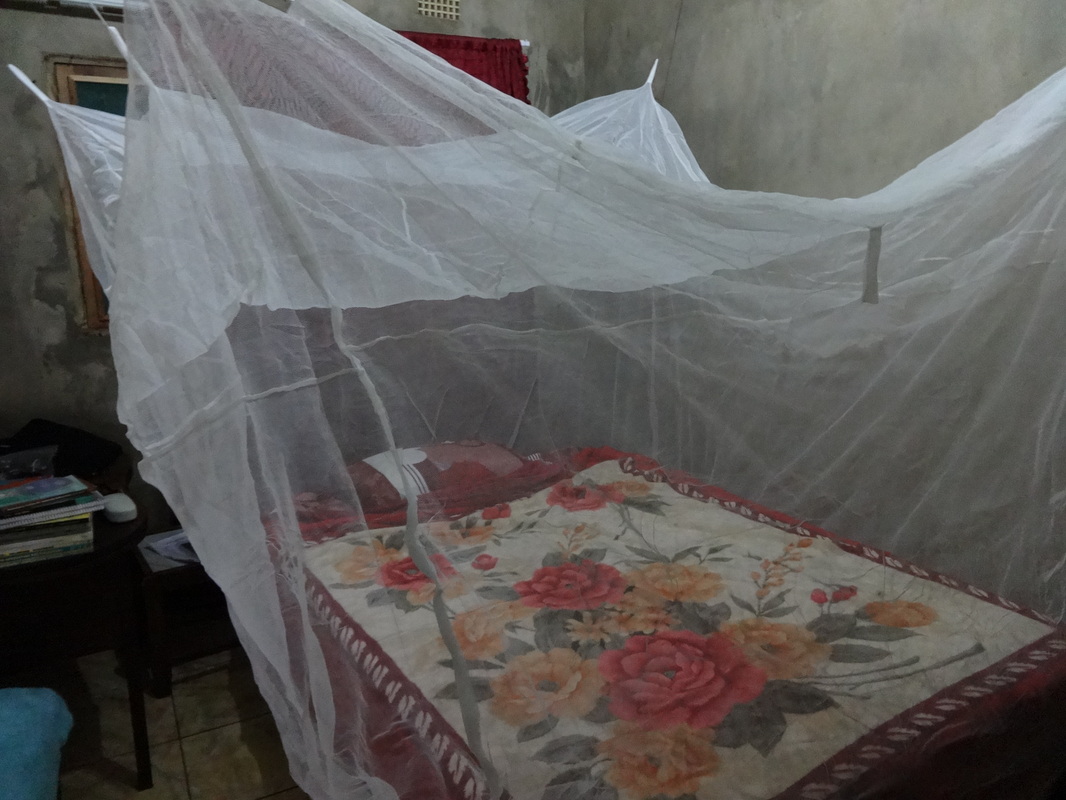
My pillow fort / mosquito net
I have arrived!! It’s late Friday night for me here, and after a whirlwind couple of days, I write this post from the hotel in Maputo (capital of Mozambique) where I’ve been staying since yesterday. But I don’t want to get ahead of myself…
My trip started Monday morning. After a weekend of difficult but touching goodbyes, my dad dropped me off at the airport around 9:15 a.m. After checking my bags and going through security, I was in search of “Sam” and “Jordan”, two fellow Peace Corps Volunteers I knew to be on my same flight to Philadelphia. Gender-ambiguous names? Yes. They turned out to both be women (a statistical likelihood in the Peace Corps). We were off to Philadelphia for Staging!
By far the most insane thing about this experience so far has been this: within a couple of hours late Monday and early on Tuesday in Philadelphia, I met roughly 50 people and then continued to spend nearly every waking moment with them since. That’s not an exaggeration either, since we didn’t break for sleep or alone time until last night (Thursday). 50 is a lot of people, and after you spend hours and hours talking to and really getting to know a couple of them, you turn around and find yourself with a dozen more new faces and realize you’ve hardly made a dent in the group.
These roughly 50 are my fellow Mozambique Group 21 – my “freshman” class, all of us in the education discipline over here. It’s a really phenomenal group, and I’ve already met a lot of individuals I can see myself getting really close to. It’s great to be surrounded by so many like-minded people, and/but honestly, I stand in awe of a lot of them. So many are very smart, very ambitious, very friendly and confident, overall very impressive people. You get the impression that many of them are destined for great things and are ready to overcome any obstacle. I feel my motivation and my standards for myself growing in their presence. The group trends young by Peace Corps standards; although the average PC Volunteer age worldwide is 28, our Mozambique group is compromised almost exclusively of people in their twenties, with many individuals being right out of college, having just graduated in May.
 At JFK Airport. "Do not leave your baggage unattended." At JFK Airport. "Do not leave your baggage unattended." Anyway, back to Staging. Staging at our hotel in Philadelphia was all about getting-to-know-each-other ice-breaker activities, an overview of what the next two years will be like, talking about what’s expected of us as Volunteers, addressing our hopes and fears, plus a lot of paperwork. After a full day of this on Tuesday, we finally boarded two buses at 2 a.m. (Wednesday morning) bound for New York City. I’m not sure why they built so much time into the schedule, but we arrived at JFK airport at 4:30 a.m., 6 hours early for our flight! Here’s a picture I took of our group around sunrise, waiting to be allowed to check our luggage. Conversation, card games, attempts at sleep, general confusion and malaise. One of these girls was designated to hold a bag of our 50-ish new Peace Corps passports.
Two fun things about traveling with this group: (1) We made the journey to Mozambique without the aid of any Peace Corps staffer. 50 people just sort of figuring things out as we went along. It was empowering and it felt nice to be trusted with this responsibility. There’s not a lot that can trip up 50 capable people working together. (2) The extent to which this group looked out for each other and has been looking out for each other from the start has been staggering. With remembering and carrying luggage, with rearranging the contents of luggage to meet baggage weight requirements, with support, with everything. It feels really great to be a part of this community of kind-hearted people.
The flight to South Africa was over 15 hours long, and there’s not much else to say about that—everyone watched a lot of movies, tried to sleep a bit, and talked to each other. You emerge from that kind of passage and have no idea what time of day it is, or even what day it is. The crazy thing is that a Peace Corps group bound for Senegal that we met in Philadelphia said their flight was only 7 hours long; a staggering disparity from our trip. Africa is SO immense.
In Johannesburg, South Africa, we had another long wait for our transfer to Mozambique. Another Volunteer (Heather) and I were made to check out carry-on luggage at the gate in New York (mine was my guitar), which were then sent to the luggage carrousel in Johannesburg, which meant we had to actually go through immigration and enter South African soil to go get them; they wouldn’t arrive in Maputo without our intervention. Long story short, we got South African stamps in our passports. :)
We arrived at the airport in Maputo, Mozambique (mid-afternoon on Thursday), retrieved all our luggage (not a single person lost a single possession from a single bag), and were greeted by the PC Mozambique country director, Carl. Carl greeted us with… paperwork. (This has been the story of the whole trip, there’s always something else to do—our biological needs, like sleeping, can wait :) ) Carl seems like a great guy and I think we’re lucky to have him running the show over here.
Outside of the Maputo airport, we packed into a bunch of little vans, or chapas, and had an awesome ride through the city to our hotel. So exciting! There were palm trees everywhere. The streets were all full of life. With the Portuguese words on shop fronts and signs (so similar to Spanish), it all reminded me a lot of places I’ve been to in Latin America. Our destination was the Hotel Cardoso in Maputo, where we’ve been staying since we arrived yesterday. It is super fancy by the standards in this country, and even pretty nice by the standards back home in the U.S. The PC staff is constantly saying, “don’t get used to it,” constantly stressing how atypical this lifestyle is compared to what we’re about to embark on. Apparently, there is no other hotel in the city that can accommodate all of us.
Upon arrival at the hotel yesterday, there was more paperwork to do and then most of the group got shot up with vaccines and had medical interviews. No rest for the weary. At 7 o’clock we had a huge, nice dinner which probably consisted of a bunch of Mozambican foods I hadn’t eaten before—not totally sure what all I ate. One Mozambican thing I know for sure I tried was peri peri (as I believe it’s called). It’s a hugely popular sauce here.
There’ve been a bunch more relatively mundane things to do between last night and tonight. Let’s just say that the 7 hours of sleep I got last night in an actual bed were absolutely divine, and that the big items since then have been security briefings, overviews of the education program here, and my personal “medical interview,” where I was given my anti-malaria medicine. I start that tomorrow.
The fancy hotel with hot showers and elaborate meals, all the English—almost none of this stuff so far resembles the real Mozambican experience I will come to know. That begins to tomorrow: around noon, we leave the hotel and go to Naamacha to meet our host families for lunch! I’m really excited about this part, and just about all the other volunteers are too. I don’t have a lot of details about this yet, but I do know my family is supposed to consist of a mother and father, a son, and a daughter. I gotta learn Portuguese real quick! They don’t speak English (a good thing).
Anyway, sorry that my thoughts are pretty scattered in this post. I wish I had the time to do better justice to all the exciting things that’ve transpired this week and what it has been like, but it’s been too hectic and I’ve been too busy. Not sure when I’ll be able to post again, but I certainly will when I get the chance. Wish me luck meeting my host family tomorrow!
Much love,
Brian
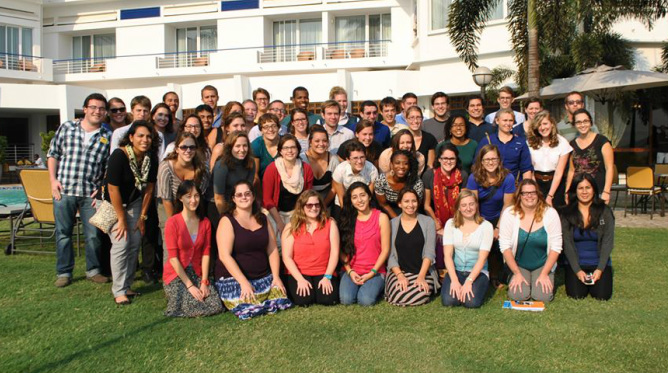 Peace Corps Mozambique Group 21 !
My trip begins tomorrow (!!) with a late morning flight to Philadelphia for Staging. I'll be arriving the evening before everything starts.
September 24: Staging (in Philadelphia)
Staging is basically a chance for all the new Volunteers to meet each other and have a stateside orientation before traveling over to Mozambique together. Staging is one day only, from roughly noon until evening this Tuesday. There are documents to sign and other such things. Mozambique Volunteers only!--my “freshman” class.
September 25-26: Travel
At 2 a.m. the morning of Sept. 25, we all hop on a bus for New York City. From there, it’s a long flight to Johannesburg, South Africa, our one and only layover. By then it’ll be the middle of the night there, I think. Sleeping in the airport? The next day (Sept. 26) we fly to Maputo, the capital city of Mozambique. I’m not totally sure what happens next, but it basically involves a 2-hour drive to the Pre-Service Training city, Namaacha. It looks like Namaacha is VERY close to Swaziland and South Africa, which is exciting. Anyway, I think this is the point where I meet my Mozambican host family… and hopefully get to finally sleep in a bed again after like 48 hours.
September-December: Pre-Service Training (in Mozambique)
I’m really looking forward to this time. My understanding is that all us new volunteers live in Namaacha with our various host families and attend classes together by day. The overwhelming majority of what we have to learn is language—that’ll be the Portuguese that is spoken at school and at work, the country’s national language. But the training involves some other things too, such as professional development as teachers, learning about Mozambican culture, and more. At some point during Pre-Service Training (PST), we get our permanent site assignment.
December 2013- December 2015: Service at Permanent Site
This is the meat and potatoes of Peace Corps service. My permanent site is where I'll spend the following 2 years, living and working as an English teacher. It could be anywhere in the country! They don’t decide where to send all the different Volunteers until sometime during Pre-Service Training. I’ll have two projects, really: my primary project is English education, and my secondary project is something I’ll have to develop on my own after identifying a way I can help benefit the community.
One thing to keep in mind is that plans sometimes change in the Peace Corps. You occasionally hear about Volunteers starting their time in one country, then being sent to a different country midway through service for whatever reason. Then there's the outside possibility of something major—like a huge natural disaster—that causes Peace Corps to evacuate all the Volunteers from the country.
Seen in the map below, Maputo is the capital of Mozambique and Namaacha is the Pre-Service Training city! Right near the borders with South Africa and Swaziland.
This summer has been all about reconnecting with friends and family, trying to psychically come home from Ecuador and sort through the last year and a half, and trying to get ready to go to Mozambique with the Peace Corps. A 3-month period between two colossal trips. There’ve been a lot of good moments with family and friends that have been restorative and just plain nice. It’s been a time of settling into easy familiarity, manic binging on old favorite foods and material comforts, and/but also plenty of anxiety. A monsoon of Peace Corps logistics. And a whole lot of woah—I’m a lot different than I used to be.
Here’s a look at what I’ve been up to this summer:
 Cuenca's Parque Calderón and New Cathedral Cuenca's Parque Calderón and New Cathedral Ecuador.
This summer brought to a close my 18-month stint in the unforgettable Cuenca, Ecuador (think Brigadoon set in South America :) ), where I spent my time teaching English and meeting incredible human beings. I returned from Cuenca on June 20th, in all honesty, shattered. I don’t think I’ve ever experienced such a mash-up of incredible highs and lows in such a short period of time as I did that last month or two in Ecuador, and if I ever do again I’m not sure I’ll survive it. The experiences, the warmth and kindness I was shown there, the people I grew so close to and then said goodbye to—these things deserve thousands of pages of words themselves and will take me years to unpack. I don’t think I’ll ever truly express just how much that trip and those individuals have meant to me.
 sunset over a sea of clouds below, my last night in Ecuador sunset over a sea of clouds below, my last night in Ecuador I was lucky to have such supportive people to come home to here in Chicago when I came home in June—my god did I need it. My mom and dad, my sisters, a couple of herculean friends—I don’t know what I would’ve done without you guys.
 Costa Rica.Mazel tov! My good friends Gideon and Molly got married this summer, and we headed down to Costa Rica in late June to kick off their awesome marriage with an awesome wedding weekend. The ceremony reached its pinnacle with the traditional groom-dancing-to-Beastie-Boys-with-his-longtime-friend-Brian. OK not really, but there was a chuppah, Gideon stomped a glass under some cloth, and then the reception began with some really fun traditional dancing. Gideon’s dad presided over the whole ceremony as rabbi, which was very cool, and Gideon’s mom later presided over the dance floor with her sick moves. Here’s a little musical tribute me and some friends put together for the couple! In the days following the wedding, my friend Pat and I got the chance to travel around the country a bit before heading home. Costa Rica is such a fantastic place. Note to Ecuador friends: apparently they say chévere in El Salvador… nowhere else that I’m aware of.
 South Dakota and Wyoming.
EPIC father-son roadtrip! In mid-July, my dad and I packed up and headed out west for an excellent 8-day trip of Oregon Trail proportions. We saw the Badlands (bizarre and beautiful), Mount Rushmore (fascinating history), Devil’s Tower (just completely unreal), the Black Hills / Custer State Park (gorgeous), Crazy Horse monument (a moving and staggeringly ambitious project), and Wind Cave National Park (most complex cave in the U.S.!). Prairie dogs and buffalo. The craziest storm I have ever driven through in my life. And more. –We definitely packed a lot into 8 days. I love a good roadtrip, and it was really great to be able to have this experience with my dad before leaving home for so long.
 Keira's Baptism Keira's Baptism Family.
I had a LOT of making-up-for-lost-time to do with my family this summer. Many birthdays, my sister’s graduation, my niece’s baptism, a mini-vacation to South Haven, Michigan—it’s been good and wholesome and restorative. I’d been missing everyone a whole lot, and I’m so lucky to have these guys. Like I mentioned above, the support and understanding and love I’ve received from my family is more than anything I could ever ask for. And congrats to Megan for becoming a family therapist!
Ps. I’m Keira’s godfather! :)
 Murder Mystery Dinner.
Every couple of years, my friend Tom Fairbank and I combine forces Power Rangers-style for some monster creative undertaking. This is the second piece of murder mystery dinner theater we’ve written, and… my god, they are not getting easier. :)
Set in Prohibition era Philadelphia, this one included mobsters, aristocrats, a flapper, an Okie, a jazz singer, and more. 14 characters with full backstories, interrelations, motives, and clues. Greg Fairbank died magnificently and arrived back on the scene a short time later as an investigative reporter with awesome glasses and a British accent. Guess who the murderer was!
 Music Project: A Chorus of Longing.My sister Megan, her boyfriend Scott, and I decided it would be fun to put together a band for one short-lived blowout summer music project. These two are CRAZY talented and it was awesome to get the chance to work with them. Megan sang lead and played percussion, Scott sang lead and played keyboard, and I played guitar. We put together 4 originals and 2 covers, including a certain Valentine’s Day 2013 serenade classic, “Para Tu Amor.” :) We had a big show last weekend at Silvie’s Lounge in Chicago and are playing again this Saturday at BRIANFEST. You can listen to some really lo-fi recordings here at our website.A highlight of this project for me was that for it, Scott wrote his first complete song, called “Time and Change,” and Spoiler Alert: it totally rocks. These two really need to keep singing together in some capacity after I leave.
 no guarantees yet that it'll actually include accordion no guarantees yet that it'll actually include accordion Solo Music Project.
Still racing to finish this! I’m recording 4 original songs professionally with my friend TJ. This project has been my baby for a long time. I would’ve recorded 7 had I had enough time! Will link to this as soon as I release it, stay tuned…
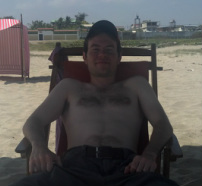 BRIANFEST is just 2 days away BRIANFEST is just 2 days away B R I A N F E S T.
My mom has outdone all other human beings and is throwing me a huge blowout going-away party, a despedida. In keeping with a theme established years ago for my sister’s graduation party (MEGANFEST), it’s called BRIANFEST. This Saturday!
To realize one's destiny is a person's only real obligation.
- Paulo Coelho, The Alchemist That’s a quote from Paulo Coelho’s The Alchemist, easily one of the most beautiful books ever written. I thought to myself, what better way to kick off my Mozambique blog than with a quote from such a great Portuguese-language novelist?
In using the word destiny, Coelho was referring to one’s Personal Legend. A person’s Personal Legend is their story, their mission, their dream, the thing they were put on this earth to do. Everybody has a Personal Legend that’s completely their own, unique to that individual. What’s your Personal Legend? You know only by listening to your heart and following wherever it takes you. This core idea pervades an astoundingly wide range of the manifestations of humanity’s thought and belief. It appears again and again across cultures and through time, from the highest art forms to the adages of everyday common sense. Follow your heart. Follow your heart. This is the advice my wise, wise parents have given me throughout my life during times of difficultly.
I think Coelho had young people in mind when we wrote about Personal Legends. For the last 2 years, I’ve tried my best to live by his dictum, and can no longer imagine living any other way. In doing so I join the ranks of many wonderful friends and personal heroes of mine who have come before. My heart and my Personal Legend now take me to the sights, sounds, and people of Mozambique, a country the currently association-free quality of whose name will seem retrospectively inconceivable to me in the coming months and years. For now, this blog is titled “Into Mozambique: Um Caminho.” Um caminho means a journey or a path in Portuguese (Portuguese being the national language of Mozambique—everyone’s second language and no one’s first). As much as this trip is about the external things I want to accomplish, it’s about my own personal journey and growth. The rewards, the frustrations, the loneliness, the camaraderie, the daily workouts of character. But above all I hope, being filled up and feeling intensely alive.
If I am to think about when this all began for me, I’d point to a talk I had with my good friend Katie Green at her Chicago apartment. This must’ve been at least 4 years ago. She’d earlier done a 2-year stint in Cameroon with the Peace Corps, a program I didn’t know even the first thing about at the time. I was amazed that such a thing existed and that she had done it, and we stayed up half the night talking over some beers, me asking her question after question.
I’m grateful to Katie for first inspiring me to do Peace Corps, and it’s my humble ambition to try to pass that seed crystal along to someone else if I can. I start this blog off in that spirit, and also just in the hope of capturing and sharing some of the incredible things I’ll be seeing and experiencing! Some of them will be concrete while others will be intangible. Jilted ex-enthusiasts of my old Ecuador blog, fear not!—I promise to do a much better job keeping blog updates coming this time around :) . I’m making it a priority.
Just found out that apparently there are a lot of mosquitoes in Africa, so I should probably go look into some bug spray or something.
Less than a week to go now! :)
|
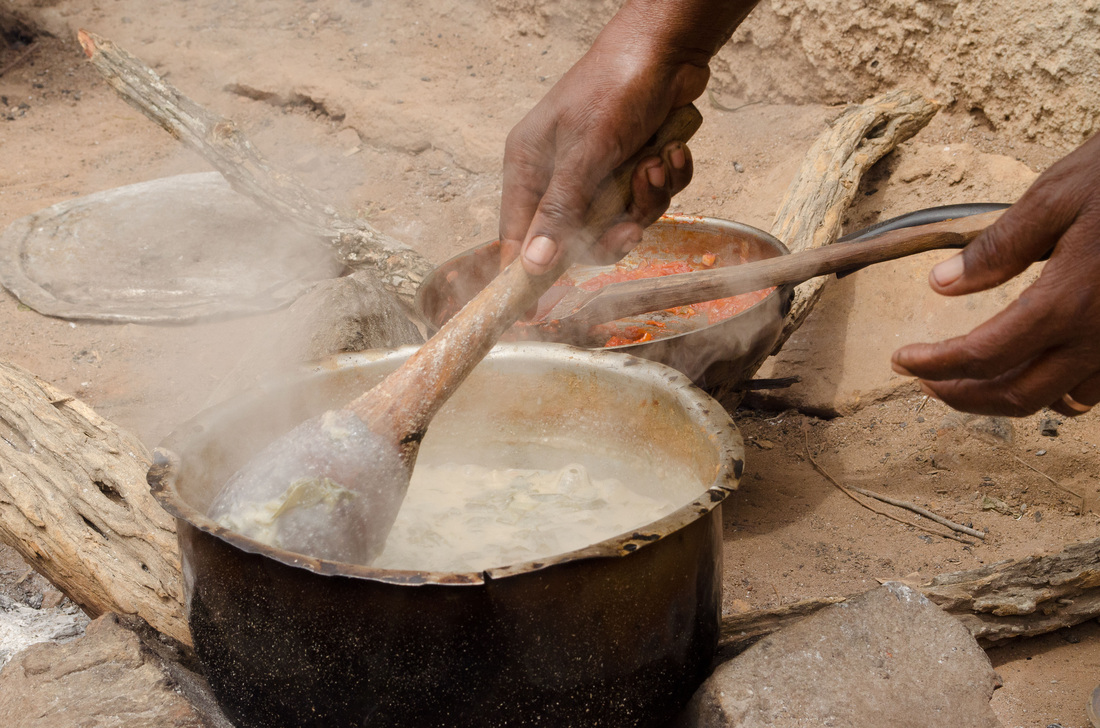






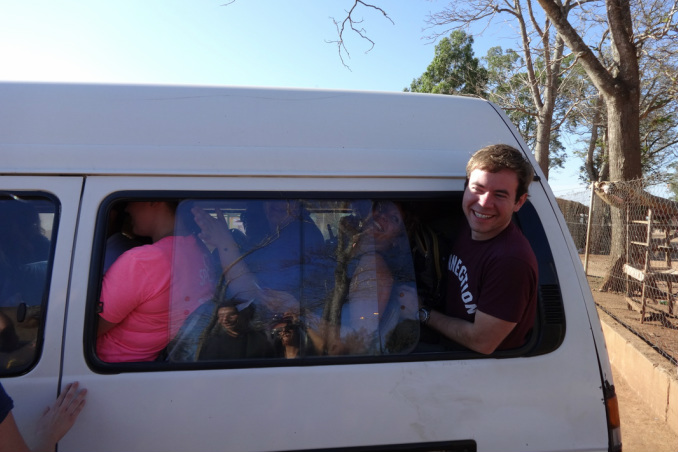












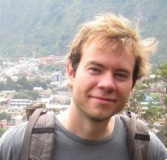
 RSS Feed
RSS Feed